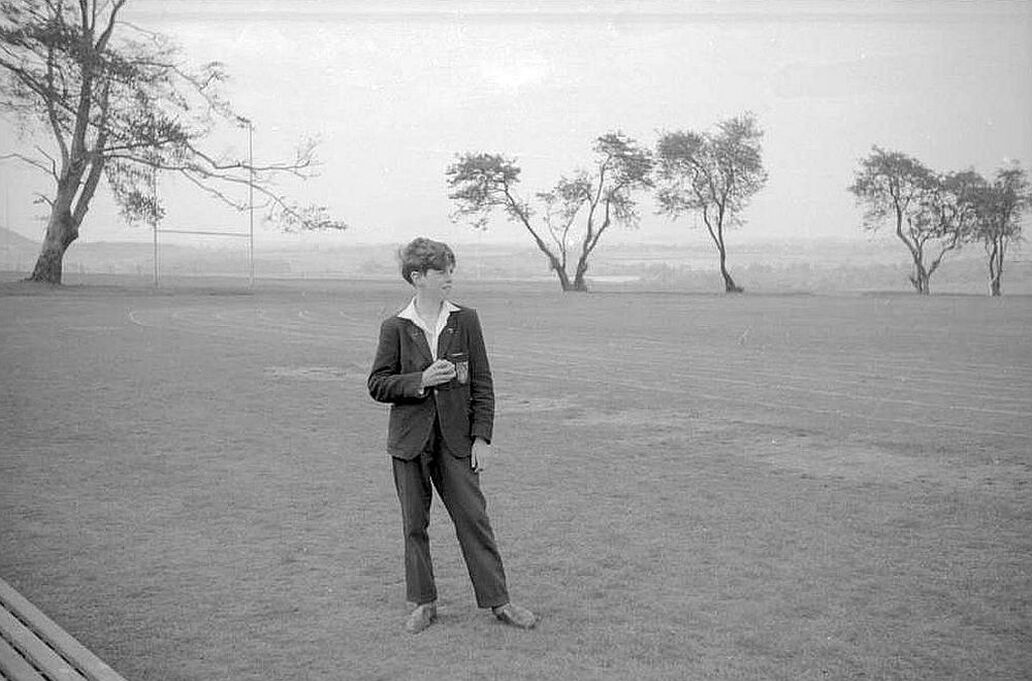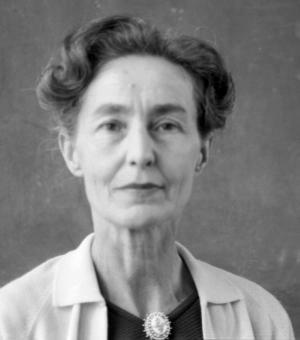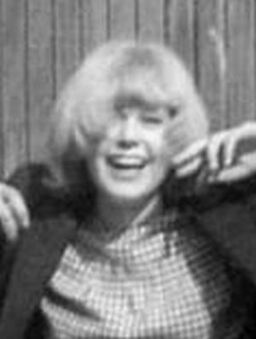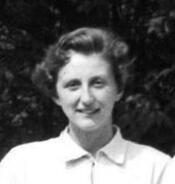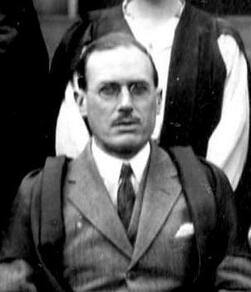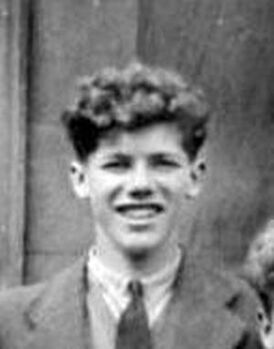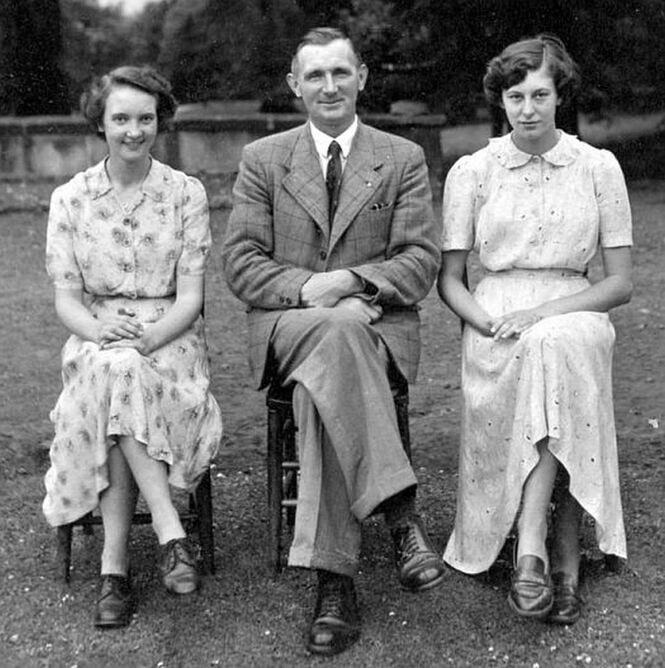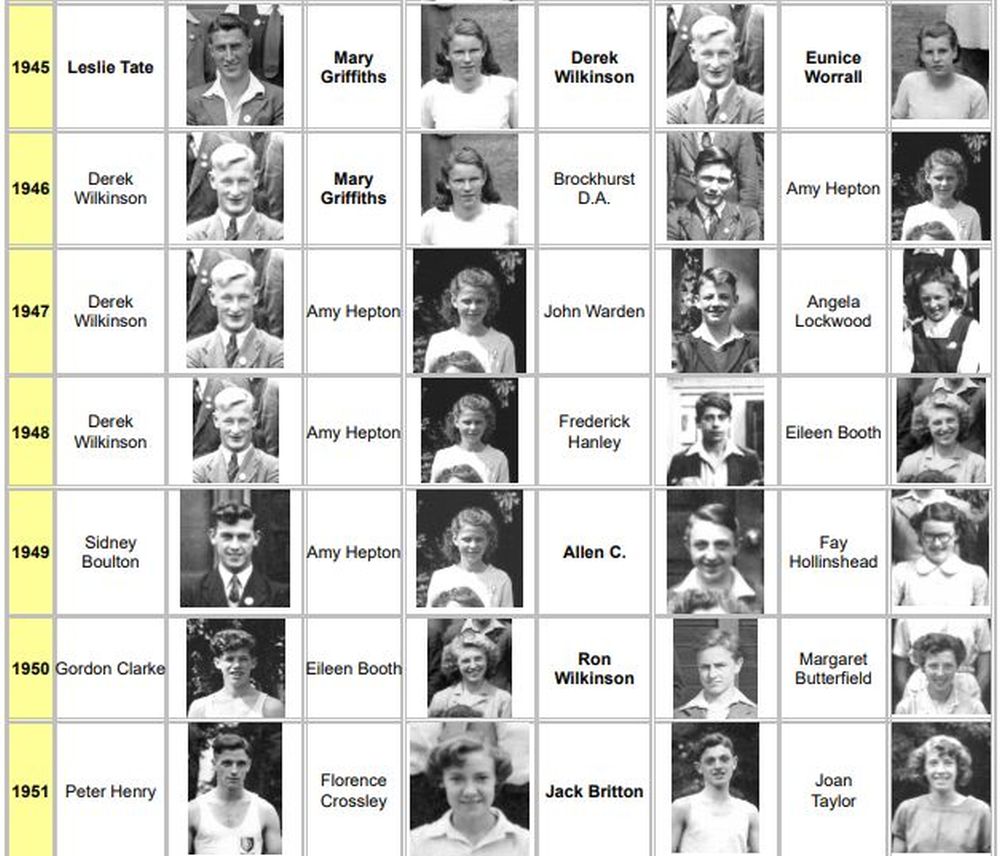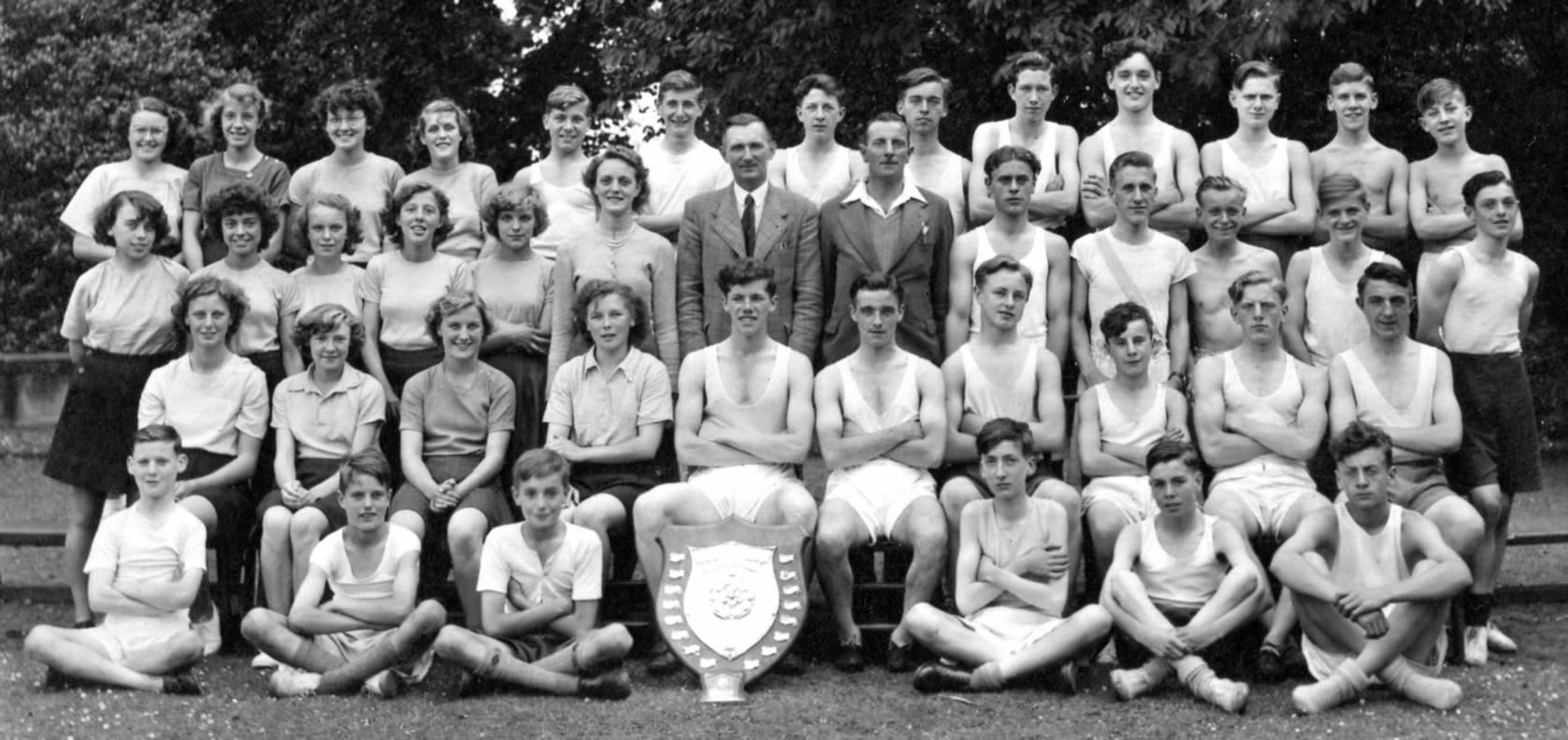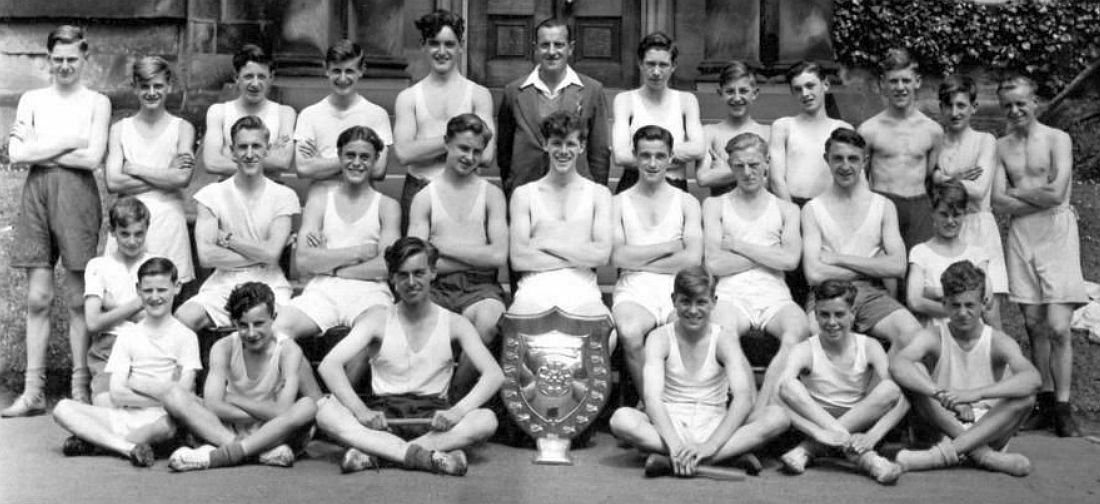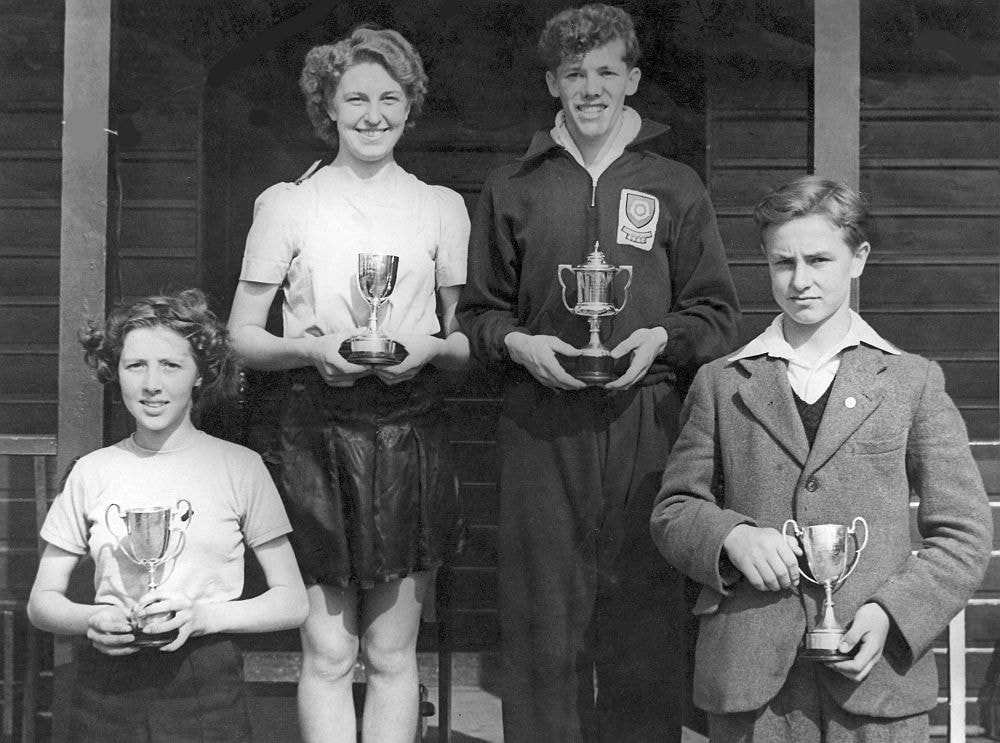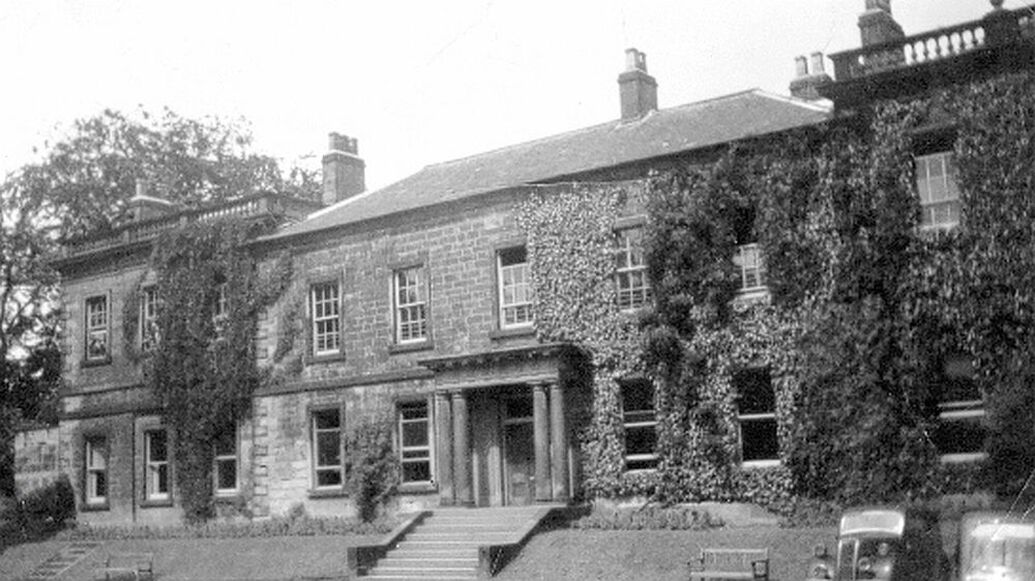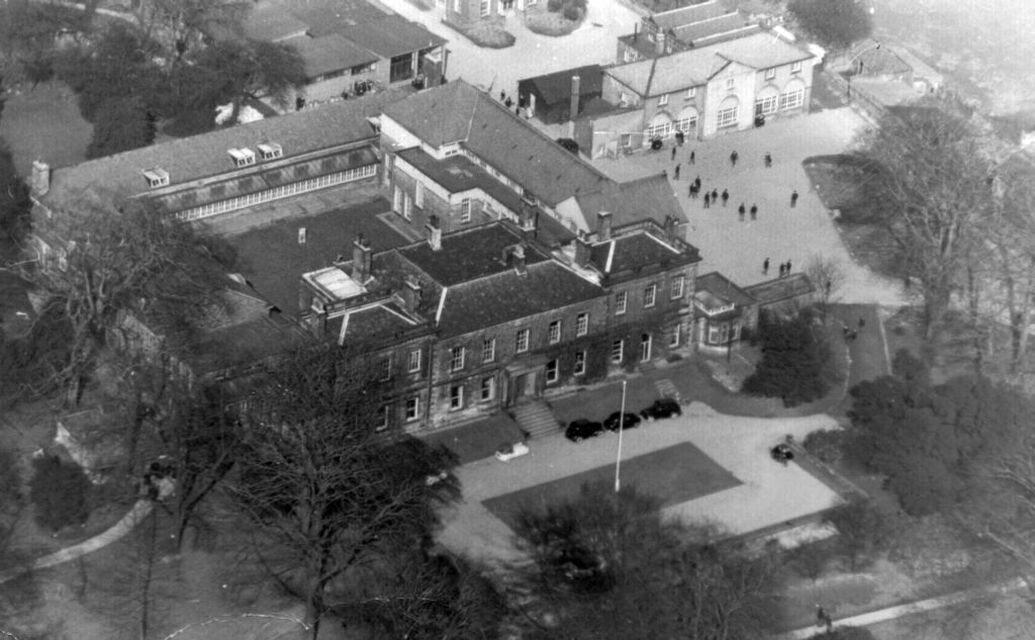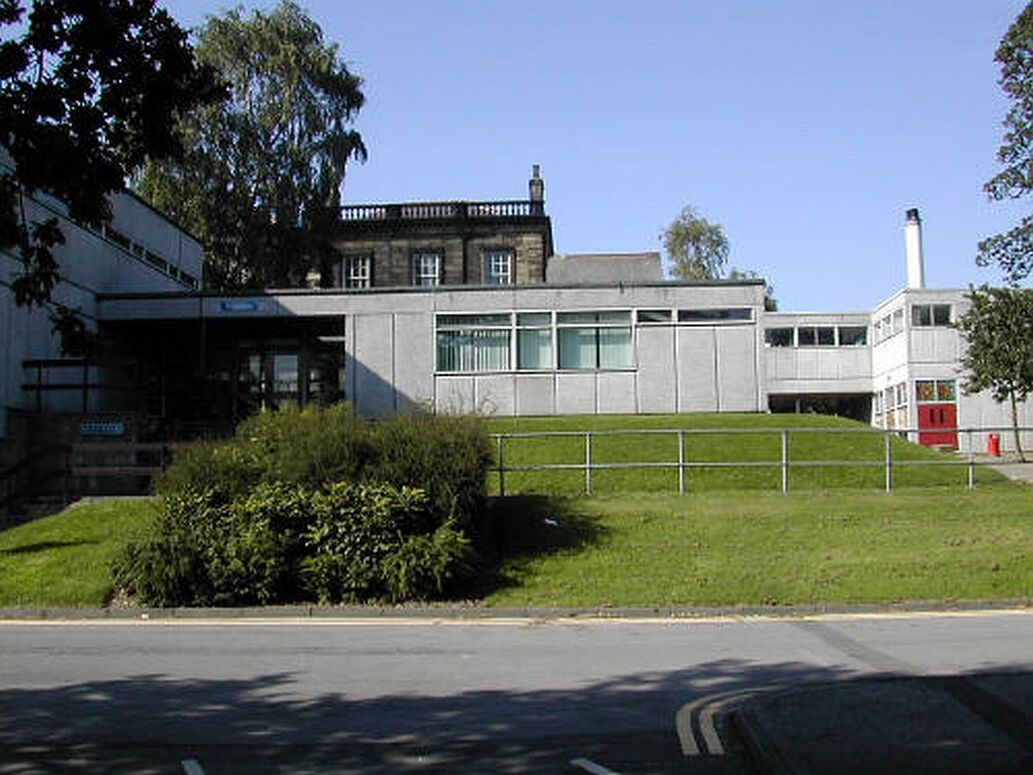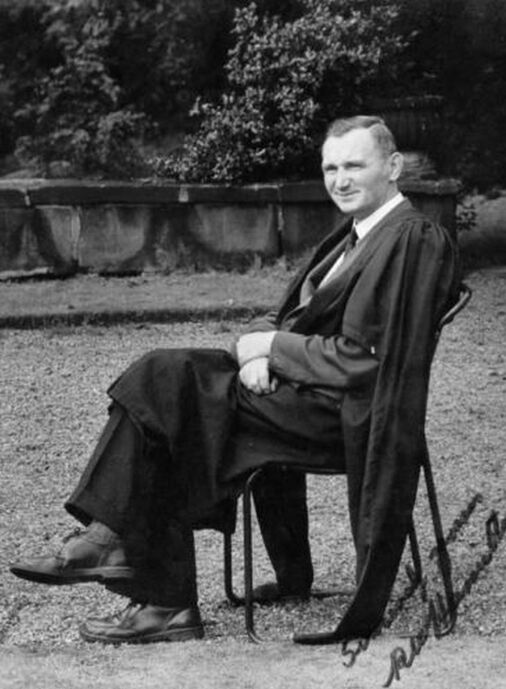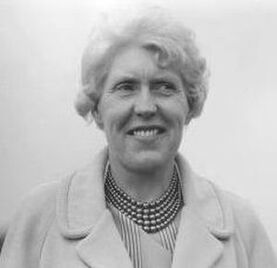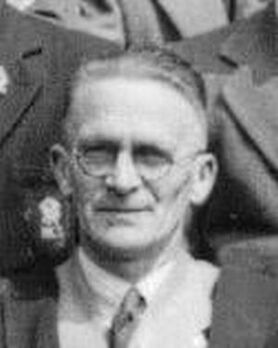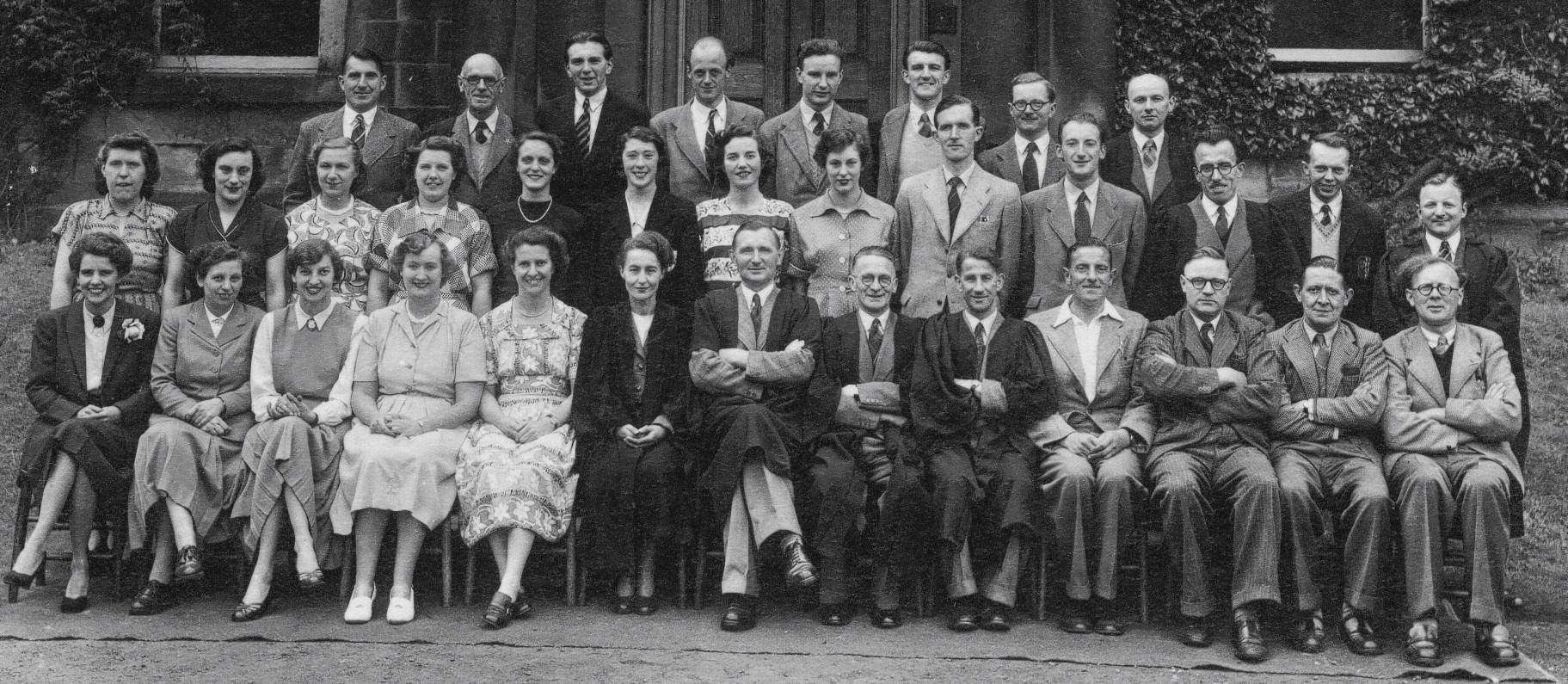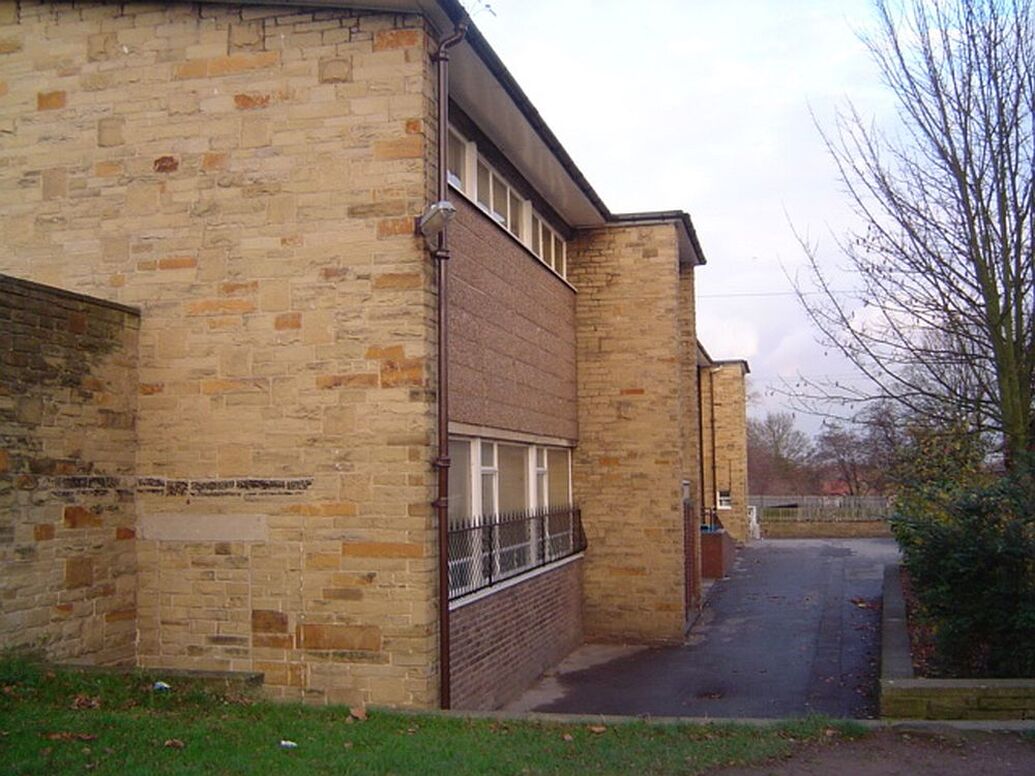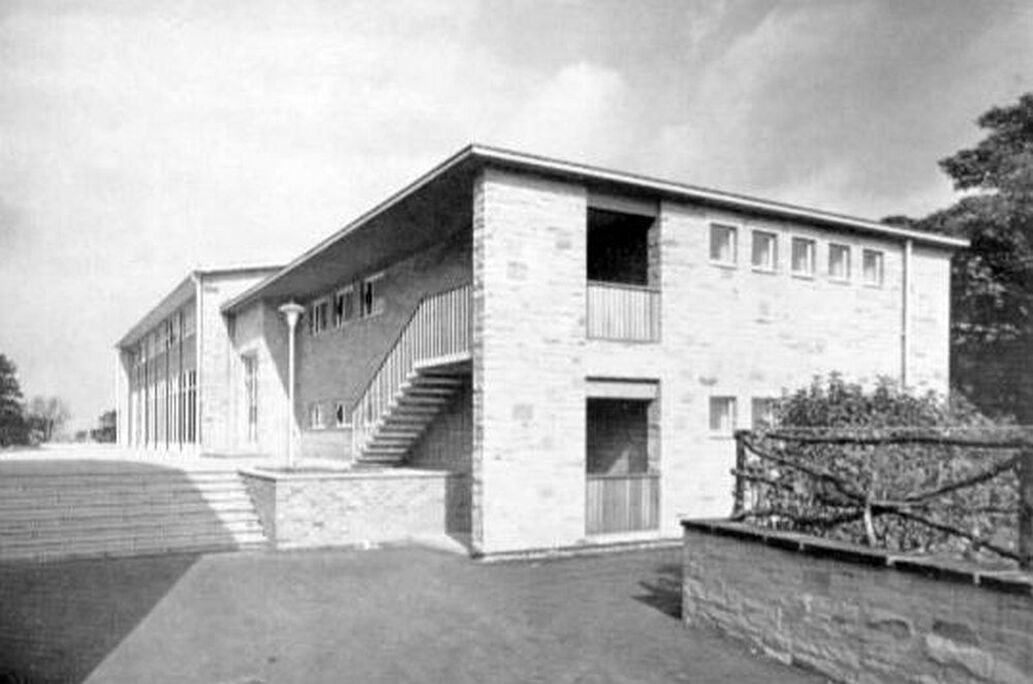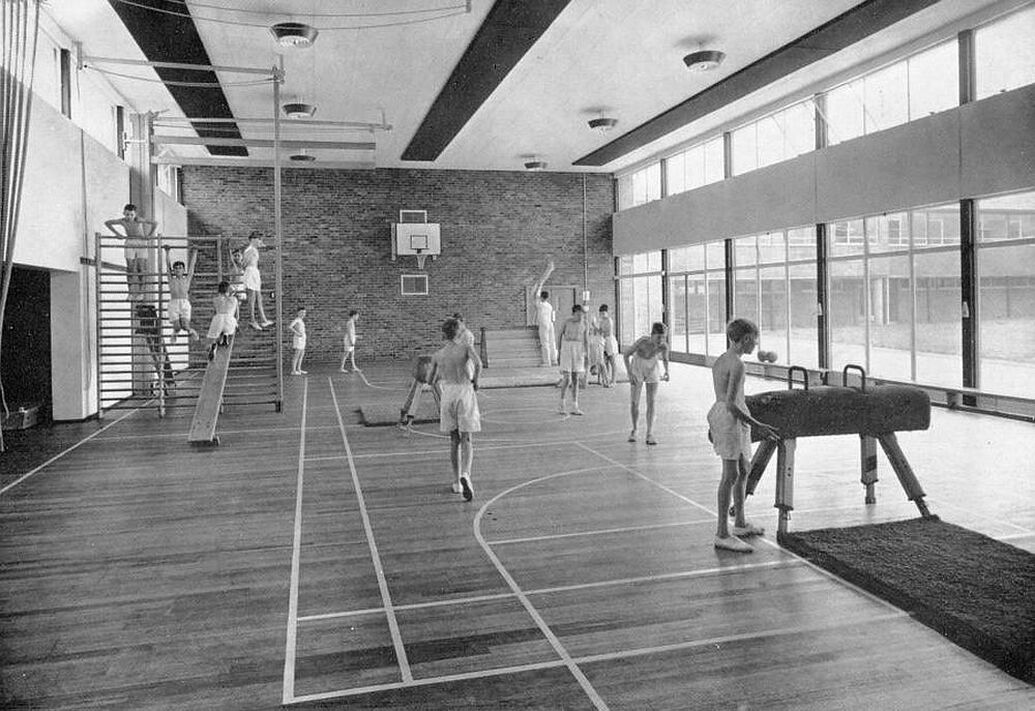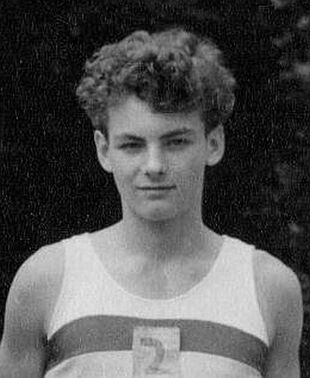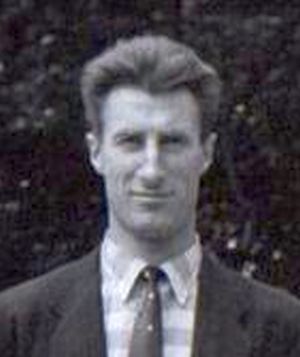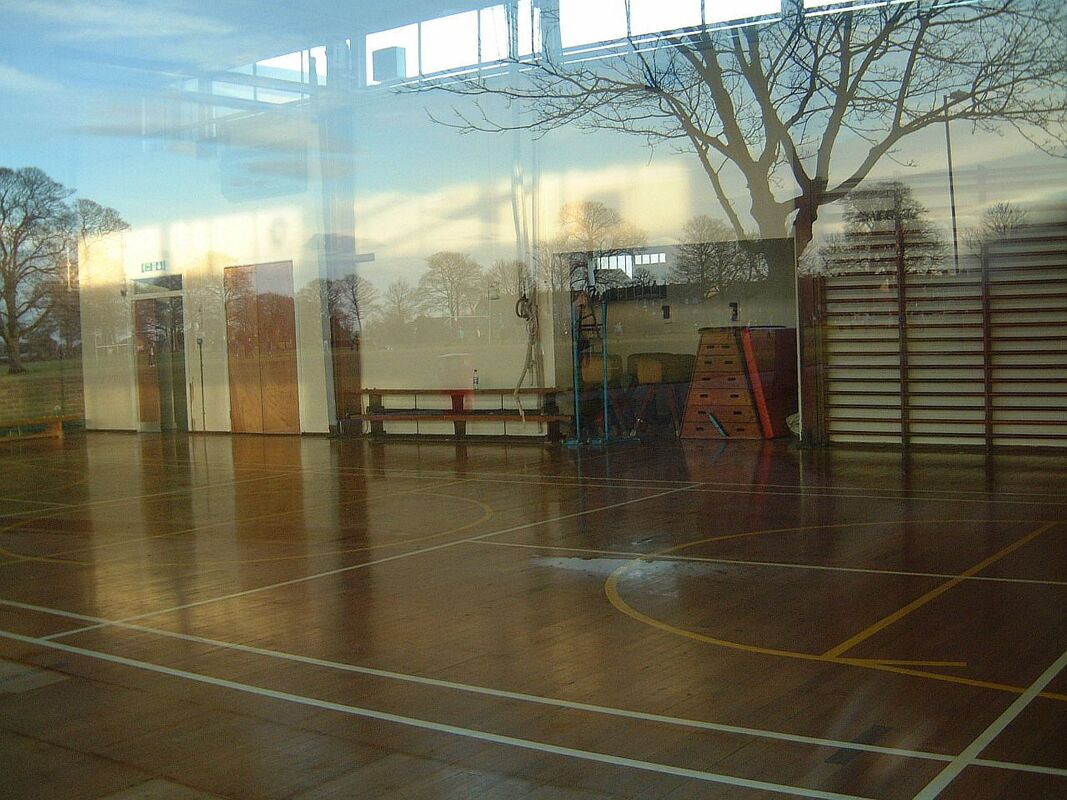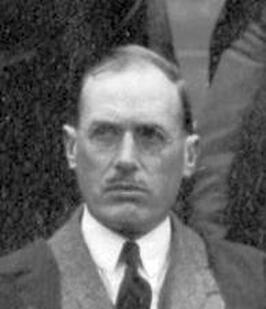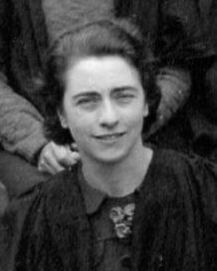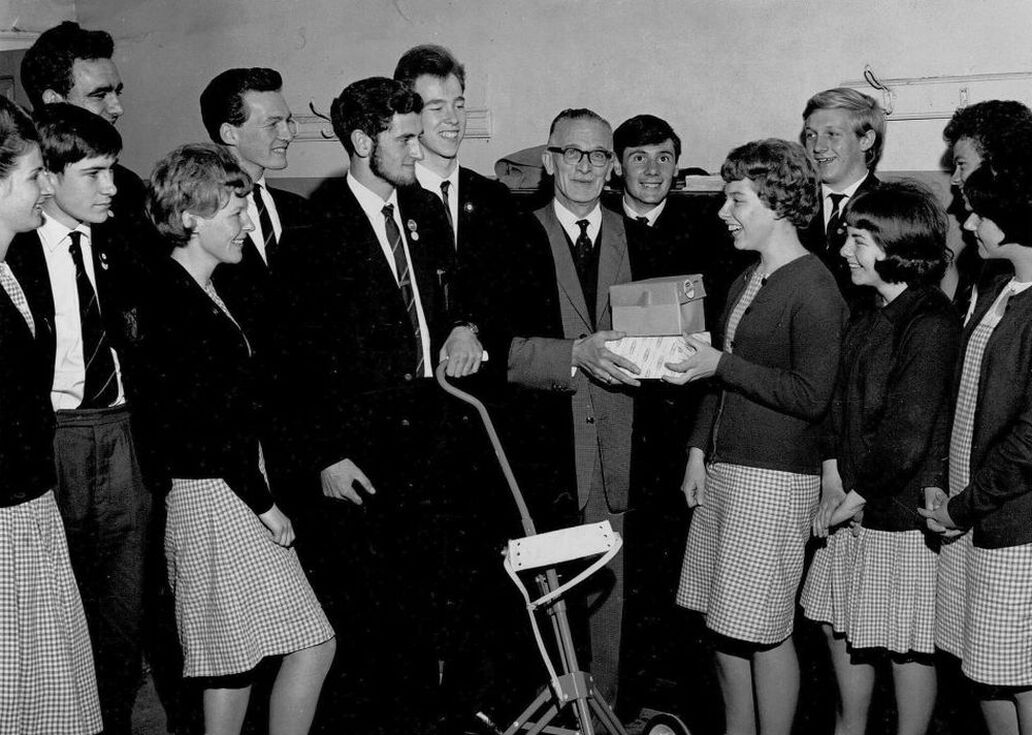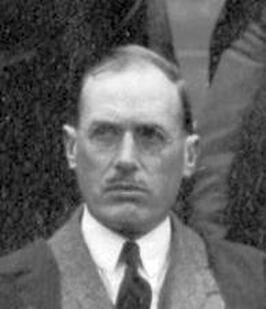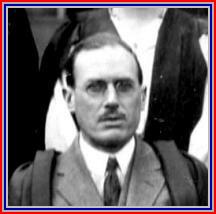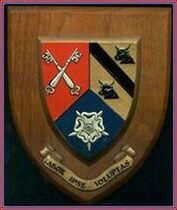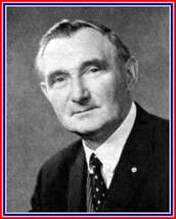A Personal View 14
Status: 8 articles
Updated: 22.09.2021
Articles below may be updated at any time.
Status: 8 articles
Updated: 22.09.2021
Articles below may be updated at any time.
Only one left plus the leaning beech tree and the hawthorns
Photo: Batey
Photo: Batey
Table of contents
|
1. The biscuit tin
2. How parents can help. 1929 3. An email from Gordon Clarke in 2004 4. Ivy and chimneys in 1951 5. The 1957 New Gym and Science Block |
6. Insights
7. Mr. Collette's retirement in 1965 8. Snippets from behind the scenes 1932 |
1. The biscuit tin
Hello again, Sheila,
Not sure I'm sending this where I should but if not then please accept my apologies and correct me so I know for the future. You asked about my memories and two come to mind at the moment, both concerning Miss Smith. I remember there were two prefects on each doorway inspecting us as we left the Assembly Hall in the morning. I wasn't wearing the regulation 50 denier stockings one day and so was told to go and stand outside Miss Smith's office.
After giving me a lecture she sent me home to change my stockings. This meant walking to Cross Hills, catching a bus to Shafton and crossing the road to catch another one to Grimethorpe. On arriving home I got another lecture from my mother. Once changed in to the correct stockings I again had to catch two buses back to Cross Hills. I can't think how long it must have taken me but I never wore the wrong stockings again.
Not sure I'm sending this where I should but if not then please accept my apologies and correct me so I know for the future. You asked about my memories and two come to mind at the moment, both concerning Miss Smith. I remember there were two prefects on each doorway inspecting us as we left the Assembly Hall in the morning. I wasn't wearing the regulation 50 denier stockings one day and so was told to go and stand outside Miss Smith's office.
After giving me a lecture she sent me home to change my stockings. This meant walking to Cross Hills, catching a bus to Shafton and crossing the road to catch another one to Grimethorpe. On arriving home I got another lecture from my mother. Once changed in to the correct stockings I again had to catch two buses back to Cross Hills. I can't think how long it must have taken me but I never wore the wrong stockings again.
Another morning I didn't feel well but my mother sent me to school anyway. I must have been genuine as I ended up in the Sick Room that morning. I remember feeling very lonely and very frightened of the Blue Lady who apparently haunted that area.
Later in the morning Miss Smith entered the room and then I wasn't quite sure whether it was the Blue Lady or Miss Smith who frightened me most! But she asked if anyone would be at home and when I confirmed there would be she said she was taking me there. We went in her car to my home in Grimethorpe. I felt like I was sat in the front of that car with some sort of VIP, which in a way she was I suppose. I saw a different side to Miss Smith that day, a side I had not really looked for before because, up until then I had just seen her as a figure of the utmost authority.
Anyhow, we duly arrived at my home. I remember walking in to our kitchen with Miss Smith and my house-proud mother's face was a joy to behold! She had washed her hair and was stood there in her rollers. My dad, who was a miner was on days and they had obviously just finished their dinner which was always on the table ready for him coming home, but also on the table was our biscuit tin (one of those big ones you get at Christmas) with the lid laid at the side of it. My dad was reading the paper in the front room so my mam and Miss Smith had a short conversation and Miss Smith then left.
Ignoring my wellbeing my mam's first words were, "What a showing up. Miss Smith stood in our kitchen, me looking like this and the lid off the biscuit tin!".
Best Wishes,
Christine Sellars
Later in the morning Miss Smith entered the room and then I wasn't quite sure whether it was the Blue Lady or Miss Smith who frightened me most! But she asked if anyone would be at home and when I confirmed there would be she said she was taking me there. We went in her car to my home in Grimethorpe. I felt like I was sat in the front of that car with some sort of VIP, which in a way she was I suppose. I saw a different side to Miss Smith that day, a side I had not really looked for before because, up until then I had just seen her as a figure of the utmost authority.
Anyhow, we duly arrived at my home. I remember walking in to our kitchen with Miss Smith and my house-proud mother's face was a joy to behold! She had washed her hair and was stood there in her rollers. My dad, who was a miner was on days and they had obviously just finished their dinner which was always on the table ready for him coming home, but also on the table was our biscuit tin (one of those big ones you get at Christmas) with the lid laid at the side of it. My dad was reading the paper in the front room so my mam and Miss Smith had a short conversation and Miss Smith then left.
Ignoring my wellbeing my mam's first words were, "What a showing up. Miss Smith stood in our kitchen, me looking like this and the lid off the biscuit tin!".
Best Wishes,
Christine Sellars
Hi Christine,
Yes, you’ve sent your memories to exactly the right place. Either Dave or I will be pleased to hear any memories from any era. Miss Smith has been mentioned many times, as an indomitable yet kind influence on us all. Someone recently mentioned that she always wore a green gown in school, unlike the black ones the men wore. Do you remember this? I have to admit I don’t! I think she was the only female member of Staff who wore a gown, though I could be wrong. I used to be impressed on Speech Days when all the Staff wore their ‘best’ finery – there was brightly coloured fur and satin on some of the cowls! Your story of being sent home to change stockings shows how different it was then. Children nowadays would not be allowed to do all that independent journeying alone, would they?
How interesting that you saw Miss Smith as a person, and not as Deputy Head when she came to your home – and that our parents had the same respect as all the pupils for Messrs Hamilton, Collette and Miss Smith!. Your car journey with Miss Smith compares with my own experience with Mr. Hamilton, when he gave me a lift in his car as he was passing through Shafton and I was late for my Test Exams. It was quite a special morning when I rolled up into the Boys’ playground and emerged from the car. I couldn’t remember much of the conversation we had, I was so "discumknockerated"!
I don’t recall ever going into the sick room, although like most pupils I knew it was next door to Room 10 – the classroom which was up a flight of wooden stairs. In fact, come to think of it, no-one has ever described the inside of the sick room to us. Perhaps we’ll ask for memories of that. It never fails to happen that one set of recollections starts another thread of memories, and so thanks for taking the time to send your stories, and if any more come to mind, we are always here.
Sincerely,
Sheila
Yes, you’ve sent your memories to exactly the right place. Either Dave or I will be pleased to hear any memories from any era. Miss Smith has been mentioned many times, as an indomitable yet kind influence on us all. Someone recently mentioned that she always wore a green gown in school, unlike the black ones the men wore. Do you remember this? I have to admit I don’t! I think she was the only female member of Staff who wore a gown, though I could be wrong. I used to be impressed on Speech Days when all the Staff wore their ‘best’ finery – there was brightly coloured fur and satin on some of the cowls! Your story of being sent home to change stockings shows how different it was then. Children nowadays would not be allowed to do all that independent journeying alone, would they?
How interesting that you saw Miss Smith as a person, and not as Deputy Head when she came to your home – and that our parents had the same respect as all the pupils for Messrs Hamilton, Collette and Miss Smith!. Your car journey with Miss Smith compares with my own experience with Mr. Hamilton, when he gave me a lift in his car as he was passing through Shafton and I was late for my Test Exams. It was quite a special morning when I rolled up into the Boys’ playground and emerged from the car. I couldn’t remember much of the conversation we had, I was so "discumknockerated"!
I don’t recall ever going into the sick room, although like most pupils I knew it was next door to Room 10 – the classroom which was up a flight of wooden stairs. In fact, come to think of it, no-one has ever described the inside of the sick room to us. Perhaps we’ll ask for memories of that. It never fails to happen that one set of recollections starts another thread of memories, and so thanks for taking the time to send your stories, and if any more come to mind, we are always here.
Sincerely,
Sheila
Sheila Kelsall (HGS 1955-62)
Miss Smith retired in 1972 and continued to live in Yorkshire until she passed away in 1994. Many former colleagues and pupils came to her funeral.
2. How parents can help.
1929
1929
Mr Jenkinson
The first Headmaster
The first Headmaster
A child's success depends not only upon the teachers or the pupils alone, but on the support of the parents, who might help by seeing that homework was done properly, in a quiet room if possible. Parents might help a great deal by never suggesting that things that happened at school were not of much importance. It was a tremendous help to a boy to feel that his parents were interested in what he was doing at school. If the father or mother spent a few minutes helping the boy, it showed there was a partnership going on, and without that partnership between the home and the school they would not get the maximum amount of success.
He hoped all the children realised that whether they were paid for or were scholarship holders, the community was at a considerable expense in enabling them to attend that school. They were all receiving what represented a large sum of money in their school life. Even if they paid fees it did not represent half of what their schooling actually cost. Why should it be worthwhile to spend that money on them? Because they might be more useful to the world in general when they had left school.
The most important thing of all was to keep themselves physically fit, otherwise the rest of their work would be hampered. He also urged them never to say they understood a thing unless they really did. They should never accept a formula unless they know how it is arrived at, because unless they understood the principle, when they went out into the world later on they would find they were doing very badly paid work for someone who did understand it.
Finally, he pleaded for attention to the small things. There used to be a tradition that things like handwriting did not matter. It was rather a superior kind of thing to write something which other people could not read. That was a grave mistake. Plain writing and neatness in their work were important, for there was more pleasure in knowing that they had done a piece of work really well and thoroughly. "A great deal of what I have said," he continued, "might be summed up in what a famous English headmaster said, "Honour your work and your work will honour you."
(Edward Thring, Headmaster of Uppingham School between 1853 and 1887.)
He hoped all the children realised that whether they were paid for or were scholarship holders, the community was at a considerable expense in enabling them to attend that school. They were all receiving what represented a large sum of money in their school life. Even if they paid fees it did not represent half of what their schooling actually cost. Why should it be worthwhile to spend that money on them? Because they might be more useful to the world in general when they had left school.
The most important thing of all was to keep themselves physically fit, otherwise the rest of their work would be hampered. He also urged them never to say they understood a thing unless they really did. They should never accept a formula unless they know how it is arrived at, because unless they understood the principle, when they went out into the world later on they would find they were doing very badly paid work for someone who did understand it.
Finally, he pleaded for attention to the small things. There used to be a tradition that things like handwriting did not matter. It was rather a superior kind of thing to write something which other people could not read. That was a grave mistake. Plain writing and neatness in their work were important, for there was more pleasure in knowing that they had done a piece of work really well and thoroughly. "A great deal of what I have said," he continued, "might be summed up in what a famous English headmaster said, "Honour your work and your work will honour you."
(Edward Thring, Headmaster of Uppingham School between 1853 and 1887.)
3. An email from Gordon Clarke in 2004
Gordon Clarke at HGS 1943-50
Hello Dave,
I had an e-mail some time ago from Sheila introducing the site; I'm afraid it's taken me equally as long to get round to contacting you all. My years at HGS are remembered with great nostalgia and happiness. I was there from 1943 to 1950 and I can honestly say they were some of the best years of my life. Memories come flooding back when I read the entries on the site and I am pleased to say that my wife and I have attended a number of the reunions arranged by Mick Cleaver. My wife attended HGS 1943 to 1949. In 1949 she became RWH's Junior Secretary moving up to Senior Secretary in 1950. Her name then was Marie Johnson. We started our courtship at HGS in 1949 and married in 1954. This year sees our 50th wedding anniversary. I wonder how many more romances started like that and are still going? During my time at HGS I was more interested in the sporting side of the curriculum, my forte being Athletics. In the earlier years I was eclipsed by those giants Les Tate and Derek Wilkinson. However, I did manage to achieve the Victor Ludorum in 1950 and also captain the victorious HGS Athletics team which won the Inter Schools Shield and the Senior Boys plaque at Huddersfield.
I think it's wonderful to find such an informative site dedicated to a school and staff who nurtured us in our formative years. I have many memories and I promise I will pass them on as I gather my thoughts; I have also a number of photographs covering those years both of myself and my wife Marie and I will scan them and pass them on to you. Many thanks to you and to Sheila for providing us with such an excellent site.
Best Wishes
Gordon Clarke
(April 2004)
Dear Gordon,
Thank you for getting in touch with the site. Your fond memories of HGS are echoed by many. I have identified you on some of the site's photos. In particular your Athletics team which won the Huddersfield Sports. Here we have a link as eleven years later I held that same shield on behalf of the School. There are other links. On the 5C photo I can see Leighton Smith and Irene Wright. My wife and I met Leighton quite recently in Walton and last August we met Irene. Les Tate was my PE teacher at HGS and after college I worked with him for two years. He was a keen competitor and sportsman even then. It was good to meet him again at the Mick Cleaver Reunion of the 24th March. Please think of the site as your own. I look forward to receiving your photos and memories.
Best wishes,
Dave McKenzie
HGS 1955-62, Holgate.
Thank you for getting in touch with the site. Your fond memories of HGS are echoed by many. I have identified you on some of the site's photos. In particular your Athletics team which won the Huddersfield Sports. Here we have a link as eleven years later I held that same shield on behalf of the School. There are other links. On the 5C photo I can see Leighton Smith and Irene Wright. My wife and I met Leighton quite recently in Walton and last August we met Irene. Les Tate was my PE teacher at HGS and after college I worked with him for two years. He was a keen competitor and sportsman even then. It was good to meet him again at the Mick Cleaver Reunion of the 24th March. Please think of the site as your own. I look forward to receiving your photos and memories.
Best wishes,
Dave McKenzie
HGS 1955-62, Holgate.
Mr Hamilton and his secretaries.
School Year 1949-50
School Year 1949-50
L-R: Marie Johnson, Mr Hamilton, Sheila Close
Ludorum Winners 1945-51
The victorious HGS Athletics team which won the 1950 WRCC Inter Schools Shield at the Huddersfield Sports
Back Row L-R: Fay Hollinshead, Joan Taylor, Agnes Bulmer, 4, Edward Laughton, Ted Fox, 7, Gunthorpe, Roy Sault, John Littleboy, Trevor Trueman, 12, Terry Swift
Third Row L-R: Shirley Lillford, Pat Coope, Marjorie Hawkins, Margaret Butterfield, Brenda Parker, Miss Woodward, Mr. Hamilton, Mr. Leonard, Pete Schofield, Brian Lawton, Pop James, 12, Jack Britton
Second Row L-R: 1, Florence Crossley, Pat Waring, 4, Gordon Clarke, Pete Henry, Ron Wilkinson, Joe Pearson, Cyril Fozzard, Josh Allen
Front Row L-R: Mick Poole, Goulding Pugh, Frank Hudson, Don Weaver, 5, Caleb Taylor
Third Row L-R: Shirley Lillford, Pat Coope, Marjorie Hawkins, Margaret Butterfield, Brenda Parker, Miss Woodward, Mr. Hamilton, Mr. Leonard, Pete Schofield, Brian Lawton, Pop James, 12, Jack Britton
Second Row L-R: 1, Florence Crossley, Pat Waring, 4, Gordon Clarke, Pete Henry, Ron Wilkinson, Joe Pearson, Cyril Fozzard, Josh Allen
Front Row L-R: Mick Poole, Goulding Pugh, Frank Hudson, Don Weaver, 5, Caleb Taylor
Senior Boys Plaque winners at Huddersfield
Back Row L-R: Trevor Trueman, Sharpe K., Hodgson, Ted Fox, Bill Littleboy, Mr. Leonard, Roy Sault, Terry Swift, Jack Britton, George Hobson, Don Weaver, Herbert James
Second Row L-R: 1, Frank Hudson, Peter Schofield, Ron Wilkinson, Gordon Clarke, Peter Henry, Cyril Fozzard, Josh Allen, Golding Pugh
Front Row L-R: Brian Poole, Joe Pearson, Peter Gunthorpe, Ted Laughton, Len Clarke, Caleb Taylor
Second Row L-R: 1, Frank Hudson, Peter Schofield, Ron Wilkinson, Gordon Clarke, Peter Henry, Cyril Fozzard, Josh Allen, Golding Pugh
Front Row L-R: Brian Poole, Joe Pearson, Peter Gunthorpe, Ted Laughton, Len Clarke, Caleb Taylor
The School Sports 1950
The School Sports were held on July 12th and the afternoon proved to be one of the most exciting for several years, the destination of the trophies being in doubt until the closing events in many cases. The Championship Cup was won by Talbot with 313 points but it was not until the last two events that they overtook Holgate who finished second with 293.5 points. Price gained 187.5 points and Guest 175 points. The Standards Cup, awarded for the points gained by all members of the House who achieve set standards in the events, was won by Price.
Altogether nine new records were set, up, viz:- Lawton (Mile), Clarke (Sen. 440 yds.), Pearson (Jun. 220 yds. and 440 yds.), Wilkinson (Int. Shot), M. Moore (Cricket Ball), M. Hawkins (Jun. 80 yds.), J. Taylor (Jun. Hop, Step and Jump) and B. Parker (Int. 150 yds.) The Senior Victor Ludorum Cup was won by Clarke, who throughout the summer ran consistently well and won the Northern Counties Junior 440 yds. Championship. Wilkinson won the Junior Victor Ludorum. The Victrix Ludorum Cups were won by Eileen Booth (Senior) and Margaret Butterfield (Junior). Other trophies were won by Talbot (Relay Cup), Swift (Half Mile Cup) and Lawton (Mile Cup).
Henry, P. G., U6S.
Altogether nine new records were set, up, viz:- Lawton (Mile), Clarke (Sen. 440 yds.), Pearson (Jun. 220 yds. and 440 yds.), Wilkinson (Int. Shot), M. Moore (Cricket Ball), M. Hawkins (Jun. 80 yds.), J. Taylor (Jun. Hop, Step and Jump) and B. Parker (Int. 150 yds.) The Senior Victor Ludorum Cup was won by Clarke, who throughout the summer ran consistently well and won the Northern Counties Junior 440 yds. Championship. Wilkinson won the Junior Victor Ludorum. The Victrix Ludorum Cups were won by Eileen Booth (Senior) and Margaret Butterfield (Junior). Other trophies were won by Talbot (Relay Cup), Swift (Half Mile Cup) and Lawton (Mile Cup).
Henry, P. G., U6S.
Ludorum Winners 1950
L-R: Margaret Butterfield (Junior Victrix Ludorum), Eileen Booth (Victrix Ludorum), Gordon Clarke (Victor Ludorum), Ron Wilkinson (Junior Victor Ludorum)
4. Ivy and chimneys in 1951
It looks as though there were at least two varieties of ivy on the Hall Front. They were vigorous plants which at that time were a little out of control. On the aerial photo the ivy has been dealt with. Tough stuff!
The Forecourt area was always immaculate. It was a showpiece for the school. In 1967-68, however, it was found to be just right for bulldozing and covering with concrete. The stone masons' work on the boundaries of the Forecourt, and the steps down to the South Walk had to go too. Perhaps they did not convey the "Modern Image" that was required at that time. Part of the "with it" result is shown below. To put it bluntly, the new buildings were concrete "prefabs".
Photo: Riley
Mr Hamilton takes a break on the Forecourt
The chimneys in the 1920s were in use when fires were lit in the fireplaces each morning before school. In winter, pupils at the back of the rooms did not receive much heat at all. During the winter months fires were lit in the Staffrooms' fireplaces. Some staff preferred to stay on after school to mark pupils' work and prepare for the next day. The roaring fires made the Staffrooms warm and welcoming. Miss Ward told me that she was a frequent user of this facility and enjoyed the ambience which prevailed. Food was also available for the Staff.
Miss Ward (Subjects: Geography and History)
When I was working, many of the the staff tended to get away quickly at the end of the school day. At HGS, many staff stayed for team practices, play rehearsals, clubs and societies. These activities are described on the Activities page of this website. If there was a Saturday match, the same staff would return to HGS to referee or to supervise in some capacity such as the post-match refreshments which were provided in the Dining Room. This goodwill from the Staff could never be praised highly enough.
Mr Collette (Subject: English)
As the 1951 aerial photo was taken during the school day, the virtually empty Forecourt car park suggests that most of the 34 staff came to work on the bus or walked to school. There was, therefore, probably no undignified 4pm rush to get away from HGS unless the staff had to catch a bus on Crosshills in Hemsworth at a particular time.
At the end of the school day Mr Collette was often the last teacher to leave the school premises. He would walk to the Green Gate down the Girls' Walk and then along Barnsley Road (A628) to his home in Hemsworth. Mr Collette was in employment at "HSS/HGS" from 1925 until 1965 and was most probably very happy at the school. As is described elsewhere on this website, during his tenure, Mr Collette made a great contribution to the life of the school.
At the end of the school day Mr Collette was often the last teacher to leave the school premises. He would walk to the Green Gate down the Girls' Walk and then along Barnsley Road (A628) to his home in Hemsworth. Mr Collette was in employment at "HSS/HGS" from 1925 until 1965 and was most probably very happy at the school. As is described elsewhere on this website, during his tenure, Mr Collette made a great contribution to the life of the school.
HGS Staff of 1950-51
Back Row L-R: Mr. Allan, Mr. Lock, Mr. Taylor, Mr. Senior, Mr. Owen, Mr. Dodd, Mr. Combs, Mr. Revill
Second Row L-R: Miss. Ward, Miss. Austin, Miss. Corfe, Miss. Wimpenny, Mrs. Owen, Miss. Saville, Miss. McBride, Sheila Close (Sec.), Mr. Farrar, Mr. Young, Mr. Walker, Mr. Burnett, Mr. Swinbank
Front Row L-R: Miss. Horsfield, Miss. Metcalfe, Miss. Whitworth, Miss. Carter, Miss. Harris, Miss. Smith, Mr. Hamilton, Mr. Collette, Mr. Manning, Mr. Leonard, Mr. Atack, Mr. Foy, Mr. Lloyd
Second Row L-R: Miss. Ward, Miss. Austin, Miss. Corfe, Miss. Wimpenny, Mrs. Owen, Miss. Saville, Miss. McBride, Sheila Close (Sec.), Mr. Farrar, Mr. Young, Mr. Walker, Mr. Burnett, Mr. Swinbank
Front Row L-R: Miss. Horsfield, Miss. Metcalfe, Miss. Whitworth, Miss. Carter, Miss. Harris, Miss. Smith, Mr. Hamilton, Mr. Collette, Mr. Manning, Mr. Leonard, Mr. Atack, Mr. Foy, Mr. Lloyd
5. The 1957 New Gym and Science Block
The Science Block
The New Gym and Changing Rooms
A lesson in progress with Mr Tate
Dave McKenzie in 1958
I was at HGS for 2 years before these buildings were officially opened. Based in the New Block (Room 23, 1C) I was as close as any member of the school to what was going on. I did not notice too much noise or disruption to lessons. Perhaps I have forgotten what happened, perhaps not. The only thing that remains after all the years is a memory that there was a noisy little dump truck which seemed to be in very frequent use transporting building materials. I was able to chat to one of the workers from my village without any representative of officialdom intervening. As pupils we were very sensible and kept away from any danger either real or perceived. I never saw any jobsworth walking around with a clipboard. I found the whole experience informative and the outcome excellent.
As a Science student I made good use of the new laboratories for the next 5 years. I was a P.E. teacher for a couple of years and the New Gym certainly set the standard for gymnasia. I do remember entering the gym in the cooler seasons usually without a top on and immediately wanting to move around because I was cold. Good planning? Sometimes I would run around bouncing a basketball from the basket by the entrance door to the gym. However, Mr Tate soon had us warmed up in the lesson!
As a Science student I made good use of the new laboratories for the next 5 years. I was a P.E. teacher for a couple of years and the New Gym certainly set the standard for gymnasia. I do remember entering the gym in the cooler seasons usually without a top on and immediately wanting to move around because I was cold. Good planning? Sometimes I would run around bouncing a basketball from the basket by the entrance door to the gym. However, Mr Tate soon had us warmed up in the lesson!
Mr Tate in 1958
The equipment store area in the Gym has always indicated "something" to me. With Mr Tate it was always kept very tidy when not in use. It makes so much sense to do so. If pupils at the end of the lessons were allowed to simply "dump" the equipment before going to get showered and changed - I wonder what that indicates? The incorporation of a "drying room" just on the left as you entered the boys changing rooms was a brilliant design feature. It was popular too because it was always warm in there.
Mr Tate's room was between the changing room and the stairs which led up to the Gym. The phrase "Go to my room", struck fear into the toughest of recalcitrants. His tickings-off were to be avoided if possible. My goody two shoes classes did not misbehave. We enjoyed our time in the Gym. His lessons were very good. His preparation was thorough. I went to the same P.E. College as Mr Tate. He let me see his lesson planning books from when he was there. The detail was amazing. No wonder he was very successful at what he did.
Dave
Mr Tate's room was between the changing room and the stairs which led up to the Gym. The phrase "Go to my room", struck fear into the toughest of recalcitrants. His tickings-off were to be avoided if possible. My goody two shoes classes did not misbehave. We enjoyed our time in the Gym. His lessons were very good. His preparation was thorough. I went to the same P.E. College as Mr Tate. He let me see his lesson planning books from when he was there. The detail was amazing. No wonder he was very successful at what he did.
Dave
A 2003 image of the Gym with reflections.
6. Insights
a. A Matter of Etiquette?
a. A Matter of Etiquette?
Pupils were not given access to information concerning the internal or behind the scenes workings of HGS. Published Governors' reports from the 1930s, however, do give us a glimpse of those sometimes difficult meetings in times of financial stringency.
A Matter of Etiquette? What do you think?
Following on from the investigation and report of the lady Governors about the dietary and administrative concerns of the school dinners in May, it appeared that certain instructions had been issued in June 1931 from the Education Committee's Offices in Wakefield directly to the school's caretakers, Mr. and Mrs. Manning. This did not please Mrs. Blakemore, who was presiding at a meeting of the Governors in June, and who reported that she had written to that effect to the Clerk, Mr. Charles Crossley. She felt that the Headmaster should have been notified in the first instance, but Mr. Crossley stated that it was customary to issue the orders direct.
Therein lay the point at issue, and the Governing committee was without the guiding hand and sensible counsel of Ald. Price on this occasion. Mrs. Blackmore was supported by Mrs. A. Schorah. The Headmaster, Mr. Jenkinson, pointed out that he really should know about everything taking place within the school. Coun. Isaac Burns suggested that they might follow the industrial system in future, where Directors did not write to the heads of departments but to the general manager, who in turn issued orders, allowing for a certain amount of local autonomy.
Capt. Hallam thought it best that in future all correspondence be directed to the Headmaster, and the matter was closed.
Following on from the investigation and report of the lady Governors about the dietary and administrative concerns of the school dinners in May, it appeared that certain instructions had been issued in June 1931 from the Education Committee's Offices in Wakefield directly to the school's caretakers, Mr. and Mrs. Manning. This did not please Mrs. Blakemore, who was presiding at a meeting of the Governors in June, and who reported that she had written to that effect to the Clerk, Mr. Charles Crossley. She felt that the Headmaster should have been notified in the first instance, but Mr. Crossley stated that it was customary to issue the orders direct.
Therein lay the point at issue, and the Governing committee was without the guiding hand and sensible counsel of Ald. Price on this occasion. Mrs. Blackmore was supported by Mrs. A. Schorah. The Headmaster, Mr. Jenkinson, pointed out that he really should know about everything taking place within the school. Coun. Isaac Burns suggested that they might follow the industrial system in future, where Directors did not write to the heads of departments but to the general manager, who in turn issued orders, allowing for a certain amount of local autonomy.
Capt. Hallam thought it best that in future all correspondence be directed to the Headmaster, and the matter was closed.
The Headmaster, Mr. Jenkinson
b. A Pitch for the Pitch and danger abroad.
Ald. G. Price, J.P. presided at a Governors' meeting at the end of February 1931 when a letter was received from the Headmaster apologising for his absence from duty. Illness had forced him, and also other members of staff, to take time off, but he stated that had he been present at that meeting, he would have pressed for further action to be taken about the provision of a pavilion and a water tank on the school playing field. He pointed out that it was two years since these items had been promised, and nothing had been done. If they were to have water on the cricket ground ready for the 1931 season, the tank should be installed at once.
It seems contrary that the previous problem on the cricket pitch, highlighted in 1929, was that of "laying water". Now it would seem that the need was for water to be introduced to the pitch!
Mrs. Dooley proposed that the Education Authority should be urged to act immediately on this matter, and then the Clerk, Mr. Charles Crossley, was directed to convey the sympathy of the Governors to the Headmaster and staff who were ill. A short time after this local bout of illness came more serious health news about the author, Arnold Bennett, who died in Paris at the end of March when he drank the local water to prove it was safe to drink - but was poisoned.
It is an indication of the economic straits experienced by the County Authority at this time that it took six months for the Governors to realise that they were not going to receive the tank which they had asked for, and so in July 1931 they resolved to supply a hose and tap, costing £20, instead of a pump and cistern estimated at £99 / 10s / 0d.
It seems contrary that the previous problem on the cricket pitch, highlighted in 1929, was that of "laying water". Now it would seem that the need was for water to be introduced to the pitch!
Mrs. Dooley proposed that the Education Authority should be urged to act immediately on this matter, and then the Clerk, Mr. Charles Crossley, was directed to convey the sympathy of the Governors to the Headmaster and staff who were ill. A short time after this local bout of illness came more serious health news about the author, Arnold Bennett, who died in Paris at the end of March when he drank the local water to prove it was safe to drink - but was poisoned.
It is an indication of the economic straits experienced by the County Authority at this time that it took six months for the Governors to realise that they were not going to receive the tank which they had asked for, and so in July 1931 they resolved to supply a hose and tap, costing £20, instead of a pump and cistern estimated at £99 / 10s / 0d.
c. Some Staff appointments
New Appointments and a Promotion In May 1931.
New Appointments and a Promotion In May 1931.
1. The Headmaster recommended the appointment of Reginald J. Dowdeswell (Ryhill) a student of the school, as his assistant secretary, and this was approved by the Governors.
2. For the post of Botany mistress, 89 applications had been received, and of the three candidates chosen for interview, Miss D. M. Kenward, of Chester received the appointment.
3. Mr. J.W. Burroughs, the teacher of wood-work and metal-work at the school had been recommended by the West Riding Higher Education Committee for appointment as organiser of these subjects in all the secondary schools in the county. His work in the conversion and establishment of the workshops in the Coach Houses at the school had clearly impressed the county authority to the extent that he was to be given a greater scope for his talents.
2. For the post of Botany mistress, 89 applications had been received, and of the three candidates chosen for interview, Miss D. M. Kenward, of Chester received the appointment.
3. Mr. J.W. Burroughs, the teacher of wood-work and metal-work at the school had been recommended by the West Riding Higher Education Committee for appointment as organiser of these subjects in all the secondary schools in the county. His work in the conversion and establishment of the workshops in the Coach Houses at the school had clearly impressed the county authority to the extent that he was to be given a greater scope for his talents.
Miss Kenward
The "Kenward Biology Medal" annual prize came from this lady.
The "Kenward Biology Medal" annual prize came from this lady.
7. Mr. Collette's retirement in 1965
Photo from Andy Hudson. Thank you, Andy.
L-R: Susan Bristow, David Biggs, Geoff Thompson, 4, Reg Bancroft, Andrew Hudson, Adrian Cole, Mr Collette, John Byrom, Christine Kenyon, David Fearnside, Margaret Wigham, 13, 14
L-R: Susan Bristow, David Biggs, Geoff Thompson, 4, Reg Bancroft, Andrew Hudson, Adrian Cole, Mr Collette, John Byrom, Christine Kenyon, David Fearnside, Margaret Wigham, 13, 14
Hi David.
Mr Collette was a definitive educator. He had an immense presence for a small stature.
All the best,
Andy
Mr Collette was a definitive educator. He had an immense presence for a small stature.
All the best,
Andy
"I wonder how many of the present pupils could imagine Mr. Collette clad in white flannels with a ring of bells tied around his knees and coloured ribbons flying from each shoulder, and thus adorned, tripping lightly through the most intricate of dances as he took his place on the greensward with the Staff Country Dancing Team."
A record few could equal
The "Mr. Chips" of Hemsworth Grammar School is to retire. A teacher at the school for 39 years, and now Deputy Head, Mr. L. N. Collette will finish at the end of the Summer Term, but will continue to live in Hemsworth. Mr. and Mrs Collette were guests of the Old Hilmians' Association at a dinner-dance in Pontefract on the eve of Mr. Collette's 65th birthday and at which they were presented with a cheque for £100. As mid-night struck the whole company sang birthday greetings to their beloved former master. The presentation was made by Miss Freda Swaine, first Head Girl, who spoke of Mr. Collette's distinguished career and of the immense debt owed to him by countless old students. She said he had always been an invaluable link between the school and the Association, and they were pleased the link was to continue because Mr. and. Mrs. Collette were to remain at Hemsworth. The Headmaster (Mr. R. W. Hamilton) proposed Mr. Collette's health and said he had a record of service to one school which few teachers in the country could equal. It was estimated that 5,000 students had passed through his hands - a truly wonderful record. Mr. Hamilton said Mr. Collette's outstanding quality was his humanity. A renowned disciplinarian, he also had high qualities of duty, humour and courtesy, and a loyalty which extended through the school to old students and which had been valued by him (Mr. Hamilton). Mrs. Collette had become part of the School, and their family of three were all Old Hilmians.
Mr. Collette, expressing thanks for the gift, said he had had a wonderful time at Hemsworth. He recalled early days at the school, when assembly was held in the library, the friendship of his predecessor as senior master - the late Mr. Philip Crossland - and the old Commercial Forms.
May 1st. 1965
The "Mr. Chips" of Hemsworth Grammar School is to retire. A teacher at the school for 39 years, and now Deputy Head, Mr. L. N. Collette will finish at the end of the Summer Term, but will continue to live in Hemsworth. Mr. and Mrs Collette were guests of the Old Hilmians' Association at a dinner-dance in Pontefract on the eve of Mr. Collette's 65th birthday and at which they were presented with a cheque for £100. As mid-night struck the whole company sang birthday greetings to their beloved former master. The presentation was made by Miss Freda Swaine, first Head Girl, who spoke of Mr. Collette's distinguished career and of the immense debt owed to him by countless old students. She said he had always been an invaluable link between the school and the Association, and they were pleased the link was to continue because Mr. and. Mrs. Collette were to remain at Hemsworth. The Headmaster (Mr. R. W. Hamilton) proposed Mr. Collette's health and said he had a record of service to one school which few teachers in the country could equal. It was estimated that 5,000 students had passed through his hands - a truly wonderful record. Mr. Hamilton said Mr. Collette's outstanding quality was his humanity. A renowned disciplinarian, he also had high qualities of duty, humour and courtesy, and a loyalty which extended through the school to old students and which had been valued by him (Mr. Hamilton). Mrs. Collette had become part of the School, and their family of three were all Old Hilmians.
Mr. Collette, expressing thanks for the gift, said he had had a wonderful time at Hemsworth. He recalled early days at the school, when assembly was held in the library, the friendship of his predecessor as senior master - the late Mr. Philip Crossland - and the old Commercial Forms.
May 1st. 1965
Mr. Collette's retirement in 1965
The end of this term sees the end of an era in the history of Hemsworth Grammar School. The School opened in 1921 and five years later in January 1926 our present Senior Master, Mr. L. N. Collette, joined the staff. He has served the school for 39 years and a term. This is a record that is unlikely to be surpassed by anyone in the life of the school. When Mr. Collette came to the school there were approximately 16 teachers on the staff. Today there are 43. The buildings consisted of what we today call the Main Block, plus the Woodwork Shop and the other rooms in that block, plus the Dining Room. The additions to the school have been the Junior Block, the Science Block, the Gymnasium and the extension to the Dining Room. The playing fields consisted of the present cricket area, the 2nd XI. hockey field and the, 1st XV. field. All the rest of the playing areas have been added since. The present Gardener's Sheds and the Fives Court were on the site where the Science Block now stands. The Cricket Pavilion, too, was placed where the Science Block now stands. Even the Assembly Hall was not then available, for Mr. Collette well remembers Morning Prayers being held in the Library. The number of pupils was much less, about 250 to 300. Our present number is about 790.
Pupils of today and of just a few years ago think of Mr. Collette as the Senior Master and a teacher of English. In the days of the 1920's, however, a young teacher was expected to teach many subjects, and he did. In his time Mr. Collette has taught such subjects as Mathematics, History, Religious Knowledge and, above all, Commercial Subjects, - Shorthand, Typing and Bookkeeping. After English this last subject was probably his favourite. Many hundreds of boys and girls owe their present positions to the skill they acquired in Shorthand and Typing at the hands of Mr. Collette. For many of these pupils the word ''hands'' will have a significant meaning!
I wonder how many of the present pupils could imagine Mr. Collette clad in white flannels with a ring of bells tied around his knees and coloured ribbons flying from each shoulder, and thus adorned, tripping lightly through the most intricate of dances as he took his place on the greensward with the Staff Country Dancing Team. How many think of him as a stalwart member of the Staff Cricket Eleven. Yet he was and many were the school wickets he took with his googly. Not one of the present members of the School has had the pleasure of seeing him on the stage in a Staff Play. Yet many are the roles he has played and many are the tales he can tell of what went on, both on the set and behind the scenes. One of my clearest memories of him is as a Cocktail Barman. He looked exceedingly smart in his little white jacket and he was no mean hand at shaking a cocktail either!
An activity of his which has brought much joy to the individual pupil and much profit to the School, has been his organisation of the school tuck-shop. As was to be expected from one keenly interested in Commercial Subjects, it was he who volunteered to be responsible for this venture. As a result of his activity in this field the School was able to provide the chairs and curtains for the Library and the clock for the Tower. For many years to come these will be tangible marks of his service to the School.
Whatever the activities of the school Mr. Collette has always been in the forefront of those who willingly gave of their time and labour to make those activities a success. There are hundreds and hundreds of Old Hilmians who will gratefully testify to this. Rugger, Soccer, Cricket, Tennis, Folk Dancing, Acting, Producing, Business Manager - in all these spheres he has been active at one time or another. Nowadays, of course, he limits his sporting activity to golf, but it will be for his interest and participation in activities enumerated above that he will be gratefully and affectionately remembered by his former pupils.
Although at one time School Librarian, a post where as usual he left his mark, his enthusiasm for Commercial Subjects led him quite naturally to the post of Careers Master. This post he has held for more years than he would care to remember and the number of pupils he has helped to secure their first job just cannot be counted.
His outstanding quality was his kindness and consideration for others. But he was not soft! Woe betide the offender! Many a former pupil will tell you that he quaked in his shoes when Mr. Collette's eagle eye was upon him. He stood no nonsense. He had no use for the shirker. But he would go to any lengths to help one who was trying, as long as he was not too trying!
His colleagues, both present and past, wish him everything good in his retirement. Not a few of his ex-colleagues have freely and gladly admitted how much they owe him for his kindly help during their years on the staff of Hemsworth Grammar School. Many who began their teaching career here have later gratefully acknowledged the friendly advice and support he gave them during their early years as teachers. All of us who have been privileged to serve with him, sincerely wish for him and Mrs. Collette many, many years of happy retirement. Right well has he earned them!
R.W.H.
The end of this term sees the end of an era in the history of Hemsworth Grammar School. The School opened in 1921 and five years later in January 1926 our present Senior Master, Mr. L. N. Collette, joined the staff. He has served the school for 39 years and a term. This is a record that is unlikely to be surpassed by anyone in the life of the school. When Mr. Collette came to the school there were approximately 16 teachers on the staff. Today there are 43. The buildings consisted of what we today call the Main Block, plus the Woodwork Shop and the other rooms in that block, plus the Dining Room. The additions to the school have been the Junior Block, the Science Block, the Gymnasium and the extension to the Dining Room. The playing fields consisted of the present cricket area, the 2nd XI. hockey field and the, 1st XV. field. All the rest of the playing areas have been added since. The present Gardener's Sheds and the Fives Court were on the site where the Science Block now stands. The Cricket Pavilion, too, was placed where the Science Block now stands. Even the Assembly Hall was not then available, for Mr. Collette well remembers Morning Prayers being held in the Library. The number of pupils was much less, about 250 to 300. Our present number is about 790.
Pupils of today and of just a few years ago think of Mr. Collette as the Senior Master and a teacher of English. In the days of the 1920's, however, a young teacher was expected to teach many subjects, and he did. In his time Mr. Collette has taught such subjects as Mathematics, History, Religious Knowledge and, above all, Commercial Subjects, - Shorthand, Typing and Bookkeeping. After English this last subject was probably his favourite. Many hundreds of boys and girls owe their present positions to the skill they acquired in Shorthand and Typing at the hands of Mr. Collette. For many of these pupils the word ''hands'' will have a significant meaning!
I wonder how many of the present pupils could imagine Mr. Collette clad in white flannels with a ring of bells tied around his knees and coloured ribbons flying from each shoulder, and thus adorned, tripping lightly through the most intricate of dances as he took his place on the greensward with the Staff Country Dancing Team. How many think of him as a stalwart member of the Staff Cricket Eleven. Yet he was and many were the school wickets he took with his googly. Not one of the present members of the School has had the pleasure of seeing him on the stage in a Staff Play. Yet many are the roles he has played and many are the tales he can tell of what went on, both on the set and behind the scenes. One of my clearest memories of him is as a Cocktail Barman. He looked exceedingly smart in his little white jacket and he was no mean hand at shaking a cocktail either!
An activity of his which has brought much joy to the individual pupil and much profit to the School, has been his organisation of the school tuck-shop. As was to be expected from one keenly interested in Commercial Subjects, it was he who volunteered to be responsible for this venture. As a result of his activity in this field the School was able to provide the chairs and curtains for the Library and the clock for the Tower. For many years to come these will be tangible marks of his service to the School.
Whatever the activities of the school Mr. Collette has always been in the forefront of those who willingly gave of their time and labour to make those activities a success. There are hundreds and hundreds of Old Hilmians who will gratefully testify to this. Rugger, Soccer, Cricket, Tennis, Folk Dancing, Acting, Producing, Business Manager - in all these spheres he has been active at one time or another. Nowadays, of course, he limits his sporting activity to golf, but it will be for his interest and participation in activities enumerated above that he will be gratefully and affectionately remembered by his former pupils.
Although at one time School Librarian, a post where as usual he left his mark, his enthusiasm for Commercial Subjects led him quite naturally to the post of Careers Master. This post he has held for more years than he would care to remember and the number of pupils he has helped to secure their first job just cannot be counted.
His outstanding quality was his kindness and consideration for others. But he was not soft! Woe betide the offender! Many a former pupil will tell you that he quaked in his shoes when Mr. Collette's eagle eye was upon him. He stood no nonsense. He had no use for the shirker. But he would go to any lengths to help one who was trying, as long as he was not too trying!
His colleagues, both present and past, wish him everything good in his retirement. Not a few of his ex-colleagues have freely and gladly admitted how much they owe him for his kindly help during their years on the staff of Hemsworth Grammar School. Many who began their teaching career here have later gratefully acknowledged the friendly advice and support he gave them during their early years as teachers. All of us who have been privileged to serve with him, sincerely wish for him and Mrs. Collette many, many years of happy retirement. Right well has he earned them!
R.W.H.
8. Snippets from behind the scenes
Governors 1932
Governors 1932
a. The Governors and courtesy to the Headmaster
The Headmaster, Mr. Jenkinson
Fresh from his successful entry to Parliament, Ald. Price presided over an acrimonious February gathering of Governors. Mrs. Dooley complained about the amount of publicity given by the Press to the visit of the lady Governors to the school which took place without prior notice being given to anyone. She made it clear that she did not accompany the lady Governors on that occasion, and she had always presented herself to the Headmaster when visiting the school. However, she did not think the Press had been fair in broadcasting the whole matter. Mrs. Guest made it clear that she had agreed to apologise to the Headmaster for the unexpected visit, but not because she had come into the school and had lunch, which she believed was part of her work, which should not require an apology. Mrs. Blackmore said she was not concerned about the newspaper reports, and insisted that she had had the best interest of the school in her mind when she paid the visit. "I think," she said, "these meetings are the worst I attend for feeling, for we are not pulling together."
The Headmaster (Mr. Jenkinson) insisted that no Governor who was courteous would come to the school without giving him notice. Capt. Hallam made it plain that he had always, as a matter of courtesy, informed the Headmaster of his intended visit. Mr. A. Bednall thought the Headmaster was perfectly justified in asking for prior notice. Mr. W. Exley remarked that he would not have lost any dignity over the matter. Ald. Price appealed for calm, and said the Governors were trying to do their best. It was clear that opinions were not going to be changed by any further discussion, and so the next item on the agenda was introduced, and the matter was dropped.
The Headmaster (Mr. Jenkinson) insisted that no Governor who was courteous would come to the school without giving him notice. Capt. Hallam made it plain that he had always, as a matter of courtesy, informed the Headmaster of his intended visit. Mr. A. Bednall thought the Headmaster was perfectly justified in asking for prior notice. Mr. W. Exley remarked that he would not have lost any dignity over the matter. Ald. Price appealed for calm, and said the Governors were trying to do their best. It was clear that opinions were not going to be changed by any further discussion, and so the next item on the agenda was introduced, and the matter was dropped.
b. Controversy over the Caretaker's car and the Headmaster's garage
Unfortunately, when Mr. Isaac Burns mentioned the next item for discussion, the negative atmosphere seemed to continue. Mr. Burns had been told by persons unnamed that the school caretaker was sufficiently well off to have a motor van, and that a girl on the domestic staff was employed to occasionally clean the van. He wondered if this was a compulsory part of her job, and if the Governors were paying her wages for this.
Mr. Burns asked the Headmaster to what extent was he responsible for the domestic affairs of the school. Mr. Jenkinson responded that he was responsible for everything that took place at the school, although he had no direct control over the domestic affairs. He had seen one of the maids cleaning the car, but he knew nothing more about this. Capt. Hallam thought the matter might be investigated further.
Undeterred by all the refusals for funds from County Hall, Mr. Jenkinson requested the provision of a garage, as (not to be outdone by his caretaker) he was shortly to own a car. A garage could be provided at a low cost, he stated. He also gained the backing of the Governors for his request to have his house re-painted.
Mr. Burns asked the Headmaster to what extent was he responsible for the domestic affairs of the school. Mr. Jenkinson responded that he was responsible for everything that took place at the school, although he had no direct control over the domestic affairs. He had seen one of the maids cleaning the car, but he knew nothing more about this. Capt. Hallam thought the matter might be investigated further.
Undeterred by all the refusals for funds from County Hall, Mr. Jenkinson requested the provision of a garage, as (not to be outdone by his caretaker) he was shortly to own a car. A garage could be provided at a low cost, he stated. He also gained the backing of the Governors for his request to have his house re-painted.
c. Who Will Be Chairman?
When the appointment of chairman for the next year was being considered at the annual meeting of the Governors of the school in April 1932, the clerk (Mr. Charles Crossley) informed Coun. E. Ford that he was unaware if Ald. G. Price, MP, who had held that office since the opening of the school, would be able to continue, due to his political responsibilities. Mrs. Garstang proposed the re-election of Ald. Price, "not only for his interest in, but for his inception of, the beautiful school to which we are all so proud to belong". Coun. W.H. Beetham seconded, on condition that Ald. Price would be able to attend the meetings, and Coun. Ford supported. Mrs. A. Schorah stated that although she had the utmost admiration for Ald. Price, however, she moved that Capt. L. Hallam be elected chairman, as a person who would be able to attend the meetings. After further discussion, they requested the clerk to make the requisite enquiry about the availability of Ald. Price for future Governors' meetings, and meanwhile, Capt. Hallam was appointed temporary chairman.
